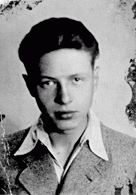You searched for: 圣卢西亚谷歌排名【TG飞机:@bapingseo】INS,FACEBOOK竞价粉【TG电报:@bapingseo】谷歌是競價排名嗎【Telegram:@bapingseo】哪里有英雄联盟比赛输赢竞猜韦德初盘怎么看大小球意甲外围网站足球特1特2是什么意思?1SggWD/B5tngv.html
<< Previous | Displaying results 791-800 of 854 for "圣卢西亚谷歌排名【TG飞机:@bapingseo】INS,FACEBOOK竞价粉【TG电报:@bapingseo】谷歌是競價排名嗎【Telegram:@bapingseo】哪里有英雄联盟比赛输赢竞猜韦德初盘怎么看大小球意甲外围网站足球特1特2是什么意思?1SggWD/B5tngv.html" | Next >>
-
Ludmilla Page recalls arriving in Auschwitz instead of Oskar Schindler's munitions factory in Brünnlitz
Oral HistoryLudmilla was born to an assimilated Jewish family in Kishinev, Romania. She and her mother, a physician, were living in Poland when the Germans invaded on September 1, 1939. They were taken to Krakow. Ludmilla was forced to live in the Krakow ghetto; her mother was sent to the Warsaw ghetto. Ludmilla worked in a factory at the Plaszow labor camp for a businessman who was a friend of the German industrialist Oskar Schindler. In October 1944, Schindler attempted to save some Jewish workers by relocating them…
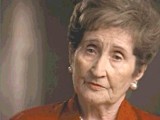
-
Ludmilla Page describes leaving Auschwitz and arriving at the Bruennlitz munitions factory in the Sudetenland
Oral HistoryLudmilla was born to an assimilated Jewish family in Kishinev, Romania. She and her mother, a physician, were living in Poland when the Germans invaded on September 1, 1939. They were taken to Krakow. Ludmilla was forced to live in the Krakow ghetto; her mother was sent to the Warsaw ghetto. Ludmilla worked in a factory at the Plaszow labor camp for a businessman who was a friend of the German industrialist Oskar Schindler. In October 1944, Schindler attempted to save some Jewish workers by relocating them…
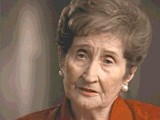
-
Benjamin (Ben) Meed describes Warsaw after the German occupation in 1939 and first experiencing antisemitism
Oral HistoryBen was one of four children born to a religious Jewish family. Germany invaded Poland on September 1, 1939. After the Germans occupied Warsaw, Ben decided to escape to Soviet-occupied eastern Poland. However, he soon decided to return to his family, then in the Warsaw ghetto. Ben was assigned to a work detail outside the ghetto, and helped smuggle people out of the ghetto—including Vladka (Fagele) Peltel, a member of the Jewish Fighting Organization (ZOB), who later became his wife. Later, he went into…
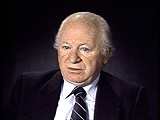
-
Benjamin (Ben) Meed describes the burning of the Warsaw ghetto during the 1943 ghetto uprising
Oral HistoryBen was one of four children born to a religious Jewish family. Germany invaded Poland on September 1, 1939. After the Germans occupied Warsaw, Ben decided to escape to Soviet-occupied eastern Poland. However, he soon decided to return to his family, then in the Warsaw ghetto. Ben was assigned to a work detail outside the ghetto, and helped smuggle people out of the ghetto—including Vladka (Fagele) Peltel, a member of the Jewish Fighting Organization (ZOB), who later became his wife. Later, he went into…
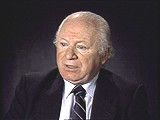
-
Ludmilla Page describes arrival at the Brünnlitz munitions factory
Oral HistoryLudmilla was born to an assimilated Jewish family in Kishinev, Romania. She and her mother, a physician, were living in Poland when the Germans invaded on September 1, 1939. They were taken to Krakow. Ludmilla was forced to live in the Krakow ghetto; her mother was sent to the Warsaw ghetto. Ludmilla worked in a factory at the Plaszow labor camp for a businessman who was a friend of the German industrialist Oskar Schindler. In October 1944, Schindler attempted to save some Jewish workers by relocating them…
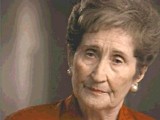
-
Charlene Schiff describes the Soviet occupation of Horochow after the outbreak of World War II
Oral HistoryBoth of Charlene's parents were local Jewish community leaders, and the family was active in community life. Charlene's father was a professor of philosophy at the State University of Lvov. World War II began with the German invasion of Poland on September 1, 1939. Charlene's town was in the part of eastern Poland occupied by the Soviet Union under the German-Soviet Pact of August 1939. Under the Soviet occupation, the family remained in its home and Charlene's father continued to teach. The Germans…
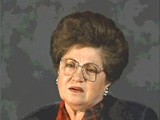
-
Charlene Schiff describes difficulties in gaining entry to the United States in the aftermath of the Holocaust
Oral HistoryBoth of Charlene's parents were local Jewish community leaders, and the family was active in community life. Charlene's father was a professor of philosophy at the State University of Lvov. World War II began with the German invasion of Poland on September 1, 1939. Charlene's town was in the part of eastern Poland occupied by the Soviet Union under the German-Soviet Pact of August 1939. Under the Soviet occupation, the family remained in its home and Charlene's father continued to teach. The Germans…
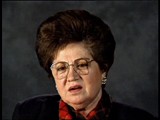
-
The Lodz Ghetto
Animated MapView an animated map of key events in the history of the Lodz ghetto in occupied Poland, from establishment by the Germans in 1940 until destruction in 1944.
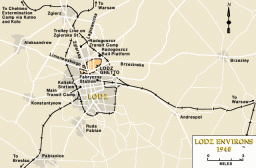
-
John Demjanjuk: Prosecution of A Nazi Collaborator
ArticleJohn Demjanjuk, initially convicted as “Ivan the Terrible,” was tried for war crimes committed as a collaborator of the Nazi regime during the Holocaust.
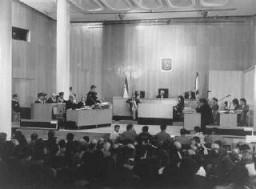
-
Welek Luksenburg
ID CardWelek grew up in Dabrowa Gornicza, an industrial town in western Poland. His father, Simcha, was a wholesale meat merchant and his mother, Rozalia, served as president of the local chapter of the Women's International Zionist Organization. Welek's older brother, Szlomo, was a dentist. The Luksenburgs were among the several thousand Jews who lived in Dabrowa Gornicza. 1933–39: Like many other children in the town, Welek attended public school. Because his family was very religious, he did not attend…
